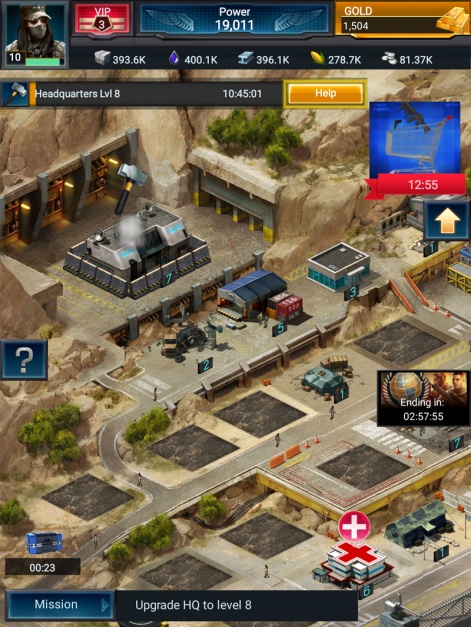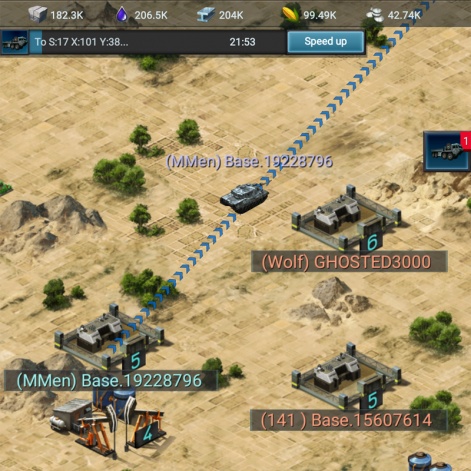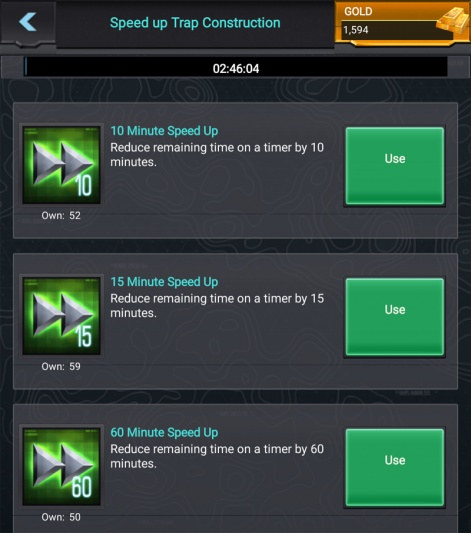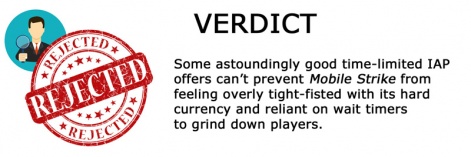Welcome back to the In-App Purchase Inspector - our regular look at free-to-play games from the consumer's perspective.
In each instalment, we consider the incentives or pressure applied to make in-app purchases, their perceived value, the expansion offered by IAPs and the overall value of the experience.
The end goal is to see whether the game makes a good enough case for us to part with our cash, or whether players are content - or engaged enough - to 'freeload'.
This time, we're taking a look at Mobile Strike, the Arnie-fronted strategy title from Machine Zone subsidiary Epic War.
Following orders
Never before has it taken so long for me to wrap my head around a free-to-play game than it has with Mobile Strike.
For the majority of the time, I felt as though I was stuck in an extended tutorial; I spent the remainder trying to fathom why the game was designed to be so restrictive and devoid of action.
You see, Mobile Strike is a base-building game where all the building takes place on prescribed plots of land; a military strategy title with 'missions' that eschew explosions for wait timers.
Your next base mission is always displayed at the bottom of the screen, with a large blue hand rather unsubtly pointing towards it.

Tap it, and you're led through a heavily-guided and irreversible process by which you prod wherever a massive green arrow tells you to.
As a simulation of military life, I'd imagine this is remarkably close to the experience of being bossed around by a disgruntled sergeant major. Whether or not it makes for an entertaining game is another matter.
(Not) learning the hard way
The issue with such hand-holding isn't merely that it's limiting, but also that it's a remarkably poor way of actually teaching your player how the game works.
I'm not that deep into the game yet - only level 12 - and so I don't know if Mobile Strike drops the arrows and pointers as you progress further.
For the majority of the time, I felt as though I was stuck in an extended tutorial.
However, to still be so overtly funnelled by the game at level 12 feels excessive, and blindly following prompts has also left me lacking in actual knowledge about the game and its systems.
The basic principle of 'learn by doing' is why other games keep their tutorials brief, but there's no incentive to learn when everything's so signposted.
Less is more when it comes to the tutorial phase, I'd argue, although Epic War is clearly seasoned enough to know what it's doing here.
Down to business
But anyway, we're veering into First Time User Experience territory. What of monetisation?
Based on the restrictive nature of Mobile Strike's design, one might expect it to be tight with its hard currency. And, on balance, this would be a fair assessment.
Although, in fairness, the game features neither ads nor an energy system, which is perhaps unsurprising given the lack of non-menu-based action.

Furthermore, I breezed through the first 12 levels without feeling any strain on resources whatsoever.
Indeed, while purchasable with hard currency (gold), resources were always in more than plentiful supply to complete the required buildings, so much so that I barely even noticed them or the their function.
The power of a sale
You begin the game with 100 gold, which isn't a particularly substantial amount - around $1 in actual money - with the game also very reluctant to give it out as a mission reward.
Bundles range from 600 gold for approximately $5 to 20,000 for around $99.99.
This series has noted something of a trend in recent entries for developers driving down the cost of their maximum IAP, but Machine Zone/Epic War's approach - understandably given the incredibly strong and high-value revenues driven by Game of War - couldn't be further removed.

However, these are merely the base prices; there is also a seemingly endless parade of 'sales' - the consistent nature of which somewhat devaluing the premise of a sale as we understand it - offering bundles of gold and resources for reduced prices.
I opted for the 'Thanksgiving Super Sale', an incredibly good value $5 deal which yielded:
- A bonus 5,000 gold on top of the usual 1,200, equalling 6,200
- 50x T-Vulture Crates
- 50x Hunter Crates
- 50x Jack o'-Ripper Crates
- 50x 60 Minute Speed Up
- 50x 15 Minute Speed Up
6,200 gold is worth more than $42 under the game's non-seasonal pricing, which is a frankly astonishing offer.
As for the crates, this is your typical gacha system for getting randomised materials - the function of which is, at this stage, utterly opaque.
Killing time
However, it's the free speed up tokens that are arguably the most valuable of the bunch. As in so many games of this type, it is the wait timers that put the harshest pressure on the player to spend, often totalling several hours.
And rather than a single cost to bypass the transaction in one fell swoop, Mobile Strike instead allows - or, perhaps, dictates - that you divide it into chunks with speed up tokens of various values, much like the system in Fast & Furious: Legacy.
Starting out, you're granted only 10 and 15 minute speed up tokens - 10 of each - with others available to purchase with gold. A 3 hour speed up, for example, costs 300 gold.

Thus, receiving such a wealth of speed up tokens - including 60 minute speed ups for those particularly lengthy HQ upgrades - is invaluable.
There are some clever ideas to encourage spending in Mobile Strike.
However, there has to be a distancing between the pain-free experience I had because I happened to start playing when Americans were eating turkey, and that of the average user.
Bigger picture
And indeed, when you take that offer out of the equation, to reach the stage I'm currently at would have either taken a whole lot of spend or a whole lot of waiting.
There are some clever ideas to encourage spending in Mobile Strike, from the bombastic false urgency of its sales messaging to the genuinely smart system of giving all alliance members a gift when one spends, as carried over from Game of War.
However, its entire structure seems designed to immediately weed out those who aren't prepared to spend money.
A sensible business move, perhaps, and the early charts certainly paint a rosy picture. However, as a consumer, there are dozens of better-looking, deeper, and more reciprocal F2P games I'd rather play.





















